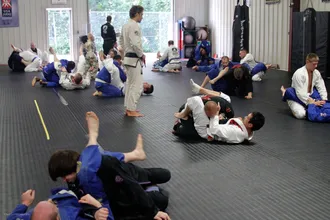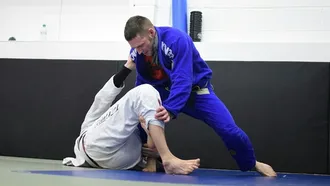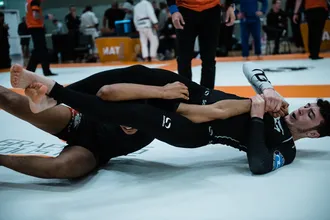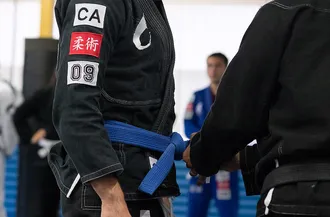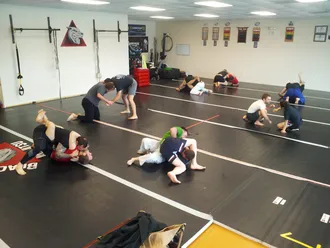
In Brazilian Jiu-Jitsu (BJJ), a black belt isn’t just a rank—it’s a mark of mastery, perseverance, and thousands of hours on the mat. Unlike other martial arts where black belts can be achieved in a few years, BJJ requires a far longer journey.
But just how long does it take to earn this prestigious rank?
- ⏰ IBJJF Minimum: 5.5 years (eligibility guideline)
- ⏳ Common Timeline: 8–12+ years of dedicated BJJ training
- ⚡ Influencing Factors: Training frequency, competition, instructor quality, and personal aptitude
For martial arts enthusiasts and beginners alike, the question remains: how many years does it take to earn a BJJ black belt? The answer depends on several factors, including training frequency, competition experience, and the philosophy of your academy.
The Path to Black Belt: A Journey of Dedication
In Brazilian Jiu-Jitsu, earning a black belt isn’t just about time spent on the mat—it’s about mastering technique, sharpening strategy, and developing resilience. Unlike many martial arts where black belts can be earned within a few years, the BJJ journey is renowned for its rigorous requirements and deep technical progression.
Consistent training over many years is essential, focusing not just on learning techniques, but on applying them effectively against resisting opponents. For most practitioners, progression involves a blend of dedicated mat time, competition experience, and continuous self-improvement.
Achieving a black belt in BJJ is more than just a milestone—it’s a testament to perseverance, problem-solving, and years of hard work in one of the most technical martial arts in the world.
How Long Does It Take to Get a Black Belt in BJJ?
While other martial arts may assign a black belt in just a few years, Brazilian Jiu-Jitsu promotions hinge on skill application and live performance rather than simply logging hours. Although the IBJJF sets a minimum of 5.5 years for eligibility, most practitioners find that 8 to 12+ years of committed training is a more realistic timeframe.
This extended journey reflects BJJ’s focus on technical proficiency, adaptability, and consistent mat time. It’s a process that rewards not just physical capability, but also your ability to learn, evolve, and truly embody the art.
Ultimately, a black belt in BJJ reflects proven proficiency and dedication. Rather than rushing the timeline, focus on consistent practice, honing technique, and refining your understanding of the art—because in BJJ, the journey is just as important as the destination.
How Many BJJ Black Belts Are There in the World in 2025?
Ever wondered how large the global BJJ black belt population really is? In 2025, tracking exact numbers is tricky due to BJJ’s decentralized nature and varying registration practices. While some black belts officially register with organizations like the IBJJF, many receive their rank through independent gyms and local federations, slipping under the radar of formal databases.
According to the IBJJF, there are 10,300+ registered black belts as of 2025. However, that figure doesn’t reflect non-registered practitioners. Estimates toward the real total number sits between 50,000 and 150,000 globally—an enormous range that highlights the diversity of BJJ affiliations and the sport’s rapid growth.
With BJJ continuing to gain worldwide popularity, these numbers are only expected to climb. New schools open every year, more athletes compete internationally, and passionate grapplers reach higher levels of skill—ensuring the global black belt count will keep rising well into the future.
The Stages of Progression and Minimum Time Requirements
Every journey to a BJJ black belt looks a little different, but the IBJJF guidelines set a general timeline for belt progression. From complete beginner to advanced practitioner, here’s what you can expect at each stage.
White Belt
- Minimum Time: None
- The Journey Begins: As the true starting point, the white belt phase focuses on fundamental movements, defense, and basic positioning. It’s all about discovery and learning the core concepts of BJJ.
Blue Belt
- Minimum Time: 2 years as a white belt (IBJJF guideline)
- Building Blocks: At blue belt, you deepen your understanding of technique and begin experimenting with more complex strategies. You’ll refine escapes, submissions, and positional control.
Purple Belt
- Minimum Time: 1.5 years as a blue belt
- Refinement and Strategy: Often considered a major milestone, purple belt is where you develop a personal style. You’re expected to sharpen techniques, chain moves together, and handle live rolling with greater confidence.
Brown Belt
- Minimum Time: 1 year as a purple belt
- Advanced Application: Brown belts polish high-level techniques and often mentor newer students. This stage bridges the gap between practicing BJJ and truly mastering it.
Black Belt
- Minimum Time: 1 year as a brown belt
- The Pinnacle of Progress: Achieving black belt typically requires a decade or more of consistent practice. Beyond technical mastery, black belts contribute to the art itself—through teaching, competing, and pushing the boundaries of BJJ.
Factors That Influence Progression
How Often You Train
Training frequency is a key determinant of your BJJ progress. While training daily or multiple times a week often leads to quicker advancement, it’s not just about racking up hours on the mat. Quality over quantity matters—focusing on technique, meaningful drills, and proper recovery will yield the best results. Remember, IBJJF timelines provide only minimum requirements; individual dedication and effective practice ultimately drive how fast you move through the ranks.
Instruction and School Philosophy
The quality of coaching and the overall philosophy of your BJJ school significantly shape your development. Academies with proven lineages and structured curriculums help you build a strong technical foundation, while experienced instructors can accelerate your learning curve by providing targeted feedback and mentorship. Finding the right BJJ gym near you can make a remarkable difference in your journey.
The Importance of Competing
Although not mandatory, competition often acts as a catalyst for growth. Tournaments challenge you to apply techniques under pressure, expose gaps in your game, and spur faster improvement. Many practitioners find that facing a variety of opponents in high-stress environments rapidly refines their strategy and execution—making each tournament a powerful learning experience.
The Unpredictable Nature of the Journey
BJJ progression isn’t strictly linear. Injuries, work or family commitments, and other life events can disrupt training plans. It’s crucial to remain flexible and patient, adapting your schedule or training intensity as needed. These setbacks, while frustrating, can also foster resilience and a deeper appreciation for the art.
The Variable Nature of Progress
While many practitioners aim for a black belt in 8 to 12 years, there’s no universal timeline. Some may achieve it faster through intensive training and natural aptitude; others take longer, whether due to personal commitments or learning styles. Ultimately, each individual’s path reflects their unique blend of effort, opportunity, and perseverance.
Embracing the Process
In Brazilian Jiu-Jitsu, the journey is often more rewarding than the destination. Each belt level represents an opportunity to refine your techniques, deepen your mindset, and immerse yourself in the art’s nuances. The true reward isn’t just earning a new belt color—it’s the lessons, personal growth, and camaraderie you gain along the way.
Although the IBJJF sets minimum time requirements, your actual readiness stems from consistent mat time, technical development, and personal evolution. Rather than rushing toward each rank, relish the process: roll wholeheartedly, absorb each technique, and allow your dedication to guide you through the next milestone.
Conclusion
Earning a black belt in BJJ is an accomplishment that reflects years of dedication and in-depth learning. While some practitioners achieve it in 8 to 12+ years, others follow a different timeline, shaped by factors like training frequency, coaching quality, and personal commitment.
Ultimately, a black belt isn’t about how quickly you earn it—it’s about the depth of your experience. Your true measure of progress lies in the knowledge, resilience, and passion you carry onto the mats every day.
Whether you’re stepping onto the mat as a first-day white belt or have been training for years, embrace each challenge, learn from every roll, and remember why you started. After all, that’s the heart of Brazilian Jiu-Jitsu—a continuous journey of growth, respect, and unwavering dedication.

